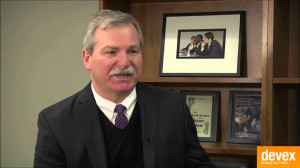Feb. 2
2015
2015
Commentary: Ten Reflections On The Ebola Crisis
by Mark Grabowsky
Top takeaways and insights from a compassionate scientist and our Chief Operating Officer, Dr. Mark Grabowsky
 Dr. Mark Grabowsky serves as COO for the Office of Special Envoy Ray Chambers. Mark has spent the past several months providing guidance and insight on the Ebola crisis to the Office and to the leadership of the MDG Health Alliance. As the crisis enters a new stage and global leaders seek lessons learned, Dr. Grabowsky shares ten high level reflections, shaped by the wisdom of years on the front lines of measles elimination, polio eradication, and malaria prevention.
Dr. Mark Grabowsky serves as COO for the Office of Special Envoy Ray Chambers. Mark has spent the past several months providing guidance and insight on the Ebola crisis to the Office and to the leadership of the MDG Health Alliance. As the crisis enters a new stage and global leaders seek lessons learned, Dr. Grabowsky shares ten high level reflections, shaped by the wisdom of years on the front lines of measles elimination, polio eradication, and malaria prevention.
- The outbreak was not so much a combination of bad luck, but of running out of good luck. There have been numerous and repeated introductions of Ebola (and Marburg) into these populations over at least the last decade. We were lucky every day to avoid one of these sparks falling on the combined tinder of traditional practices, urbanization, population mobility, and distrust of governments. Ultimately, we ran out of luck and transmission exploded.
- All public health is local. Global coordination is only effective as it results in local actions. The vast majority of the response was by local health workers. The ability to prepare and respond is a function of local public health infrastructure – perhaps the least sexy and highest responsibility of government.
- Individual behavior is everything. The factors which led to this outbreak starting, expanding and ending are all related to individual behaviors. The outbreak will be over when individual behavior has changed enough to sustainably reduce the reproductive rate (Ro) from 1.3 to <1.0. This is only a modest change but has been very difficult to achieve. Our public health tools for behavior change are only weakly effective – Time magazine quoted a CDC epidemiologist as saying that the population was “learning by dying.” We must continue to learn from and improve behavior change efforts.
- Trust is a basis for change. These countries had a pre-existing and justifiable high level of community distrust of government and other institutions, particularly amongst the poorest. Many of the initial government actions – such as selectively quarantining the most vulnerable populations – increased this distrust. The core in-country message – “Ebola is real” – speaks to that distrust.
- New technologies had little impact. The outbreak has come and almost gone without any of the new diagnostics, treatments, vaccines or even information technologies becoming available. The key was people – not technology. As a side note, we also saw that technology development could be accelerated from years to months when a crisis exists. We must ask why we fail to prioritize development of health technologies all all the time?
- The triumph of shoe leather epidemiology. The basic epidemiologic tools of surveillance, isolation and contact tracing were universally effective when applied. There was no transmission outside of Africa because of the work of local epidemiologists.
- Weak institutions cannot be made stronger by only adding money. We have learned that there are foundational weaknesses in some of these countries and institutions which will require rebuilding the foundation over time.
- Polio eradication workers were critical. The greatest threat was for Ebola to spread to Nigeria, and that it did not happen may have been the greatest triumph of the response. Polio workers with skills learned in polio eradication – surveillance, laboratory diagnosis and contact tracing – were exactly what was needed for Ebola. Ultimately, it was the polio team at WHO that shaped and led the response at the global level.
- International response is too slow. I doubt if institutions could have had a higher degree of political (or perhaps financial) commitment, but many were still were late to respond. We were fortunate in that this was a slowly spreading virus. A more contagious virus, such as Avian flu (now spreading in Nigeria) or MERS (now spreading in the Middle East), could not have been contained with this quality of response.
- There are heroes among us. It is rare for there to be a heroic individual in public health but I have heard of many and met some. There are now thousands of such heroes in Africa and within our institutions whose existence reminds us of our better angels.

